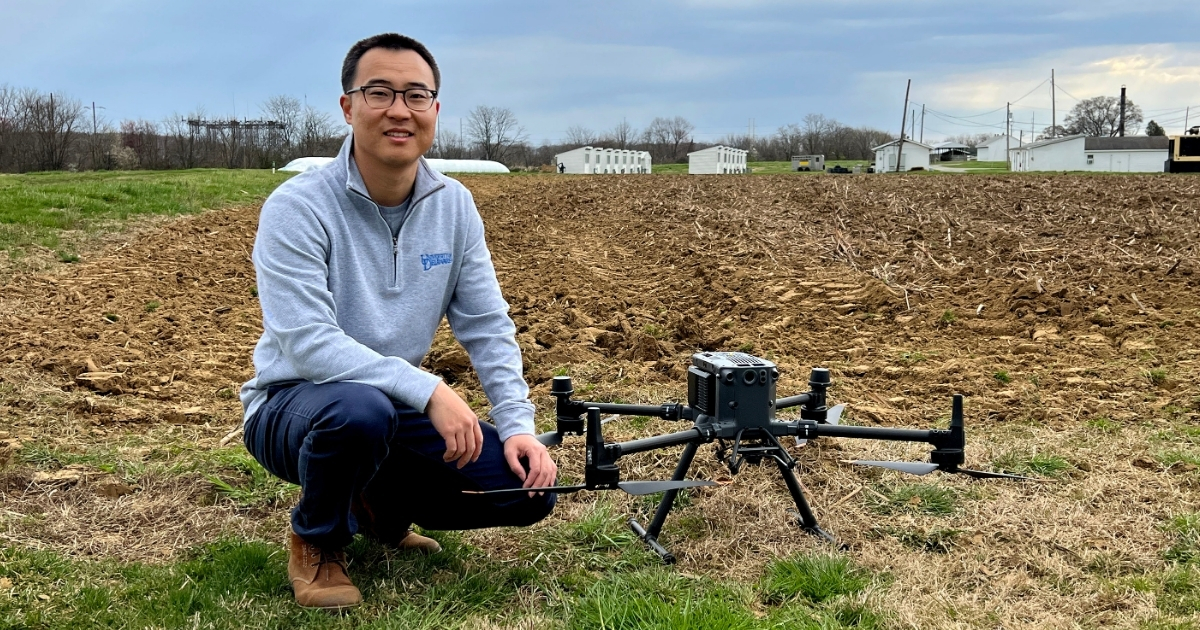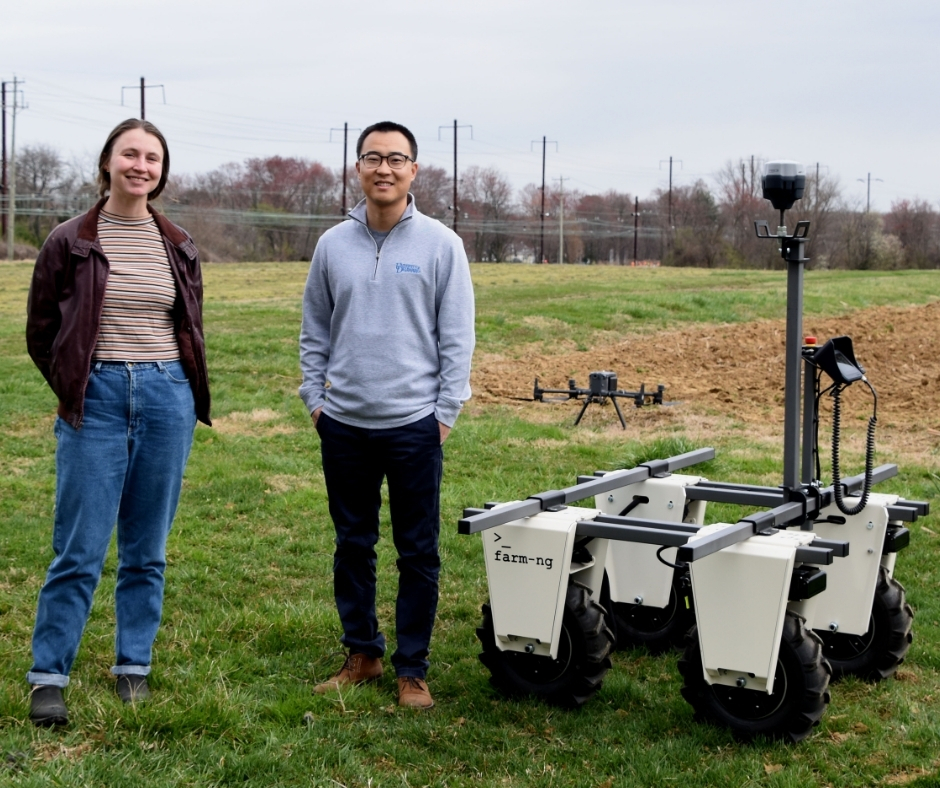
Category: Plant and Soil Sciences

Meet our new faculty: Yin Bao
April 03, 2024 Written by Dante LaPenta | Photo by Katie Young
For farmers and scientists alike, University of Delaware faculty member Yin Bao wants to make their professions much easier and more resourceful.
Bao focuses his research on digital agriculture, creating novel technologies to help plant scientists, animal scientists and farmers improve their efficiency and efficacy. He lends his expertise to everything from measuring plant performance and livestock performance to monitoring water quality.
“I really enjoy work in digital agriculture because I get to develop novel technologies that people can use to make their lives easier,” explained Bao, an assistant professor of digital agriculture. “The digital tools can help farmers make more informed decisions for crop and livestock management. For scientists, sensor and robot technologies can help measure plant traits very efficiently in the field to facilitate scientific discoveries.”
While Bao is a proud faculty member of the Department of Plant and Soil Sciences, he purposefully builds collaborations across many disciplines, making him a model citizen for the “feed the world, protect the planet” mantra of the College of Agriculture and Natural Resources (CANR).
“I am not limiting myself to only working with scientists in a single discipline because digital technology is applicable in many domains,” explained Bao. “I have a wide range of collaborations with plant scientists, animal scientists, engineers, ecologists and geo-scientists.”
To obtain scientific measures, Bao employs a wide range of techniques, including sensors, robotics, automation-related technologies and, yes, artificial intelligence. AI’s impact is being felt in so many industries. Already in the short term, Bao has seen a lot of agricultural applications.
“Just in my research area, AI is utilized to extract actionable information from sensor and imagery data in terms of plant and animal health diagnostics and prediction of complex traits such as yield, ” noted Bao. “From drone images, AI models can detect plant organs or individual animal species. Before the modern deep learning era, it was difficult to design an algorithm to reliably handle large variations of these objects in images.”
These advances enable many applications in precision agriculture. For instance, Bao points to See & Spray™ technology from John Deere. Equipped with cameras, the technology detects weeds while a tractor is cruising along at 12 miles per hour. AI makes immediate decisions on where to spray, reducing herbicides and, thus, the amount of money a farmer must spend.
Animal agriculture and natural resource conservation have also seen short-term benefits. But, for Bao, the long-term possibilities are most exciting.
“Right now, we are focusing on AI applications of various processes, but, in the future, you’ll see more of a focus on optimal decision-making,” emphasized Bao. “AI is currently very good at vision and language tasks, but humans still need to synthesize all sorts of information and make the final decisions based on knowledge and experience. In the future, we’ll have sensors, robots and AI all working together. The AI will learn from sensor data, command robots, and make the optimal decisions to enable sustainable agriculture and scientific breakthroughs.”
In his first course as a UD instructor, Bao developed a hands-on course titled Digital Technology for Agriculture and Natural Resources (PLSC 467/667, MEEG 667). Bao is teaching UD undergraduate and graduate students about the internet of things (IoT), physical devices that can be controlled through a laptop or phone over the internet. These devices are loaded with cameras and sensors assigned to monitor soil moisture, water quality and plant health. Students also learn remote-sensing techniques like drone and satellite imaging, and how to analyze those images using machine- and deep-learning techniques.

“Say that you are looking for nutrient deficiency or disease in plants. With spectral imaging, it can give you an early indication of plant stress by examining the colors beyond the visible to human eye,” said Bao. “Then machine learning can learn from the subtle differences in the leaf spectral signature to predict the specific stress and severity.”
In addition to Plant and Soil Sciences, Bao has a joint appointment with the Department of Mechanical Engineering. So, both UD plant and soil sciences and engineering students are eligible for his courses.
“I really enjoy seeing the students working through a project’s difficult challenges and then ultimately, like a puzzle, they make it work and everything fits together,” admired Bao. “In engineering education, you must get every detail right to make it all work together. Students spend a lot of time with their team members figuring out every piece of the puzzle.”
In joining the University of Delaware, Bao was drawn to UD’s research enterprise. The joint appointment gives him an opportunity to collaborate with outstanding faculty and talented students across two colleges. Already a faculty advisor for Mechanical Engineering’s senior design course, Bao also sponsored a team to design a robot for his research group.
“I was amazed at what these UD students could do in such a short amount of time,” exclaimed Bao. “This is a robot sensor platform that can travel on a center pivot or linear move irrigation system. Eventually, it will carry sensors to remotely measure soil moisture and plant health for high-throughput plant phenotyping and precision agriculture.”
In addition to the faculty and students, UD also piqued Bao’s interest because of Delaware’s compact geography.
“In Newark, we have a farm right next to our offices. I can test ground robots or drones and conduct small-scale field experiments right on campus,” explained Bao. “Then I can go to the Carvel Research and Education Center in Georgetown and do large-scale farm research. In the past, I had to travel for many hours to do this.”
Bao and the rest of his new faculty cohort saw Carvel and several other key agricultural facilities during a statewide tour with Ed Kee, CANR executive in residence. Given his long-forged relationships across the First State, Kee facilitated direct conversations with Delaware farmers.
“We spoke with very knowledgeable and progressive producers and processors. It was very eye-opening,” said Bao. “I see plenty of opportunities for collaboration and research with Delaware stakeholders.”
Expect to see Bao in CANR facilities across the state. On the UD Newark Farm, Bao is testing drones and ground automated robots. In Worrilow Hall, Bao is using hyperspectral imaging to help Qi Mu and Alyssa Koehler to screen maize genotypes for Pythium resistance. In Fischer Greenhouse, Bao is collaborating with Juzhong Tan to build a robotic system to drip fertigate lettuce plants, which incorporates fertilizer application within the irrigation water). At St. Jones Reserve tidal salt marsh near Dover, Bao is collaborating with Rodrigo Vargas on using 3D machine vision to improve ecosystem phenology monitoring. At the UD Carvel Center in Georgetown, the new UD faculty member is working on high-throughput phenotyping of plant architecture in lima bean in collaboration with Emmalea Ernest at Carvel. He also frequents UD’s Warrington Irrigation Research Farm in Harbeson, Delaware, working with the college’s irrigation research team on testing robot platforms.
The field of digital agriculture moves fast. But, judging by Bao’s research efforts, it’s safe to say that this new assistant professor is already on the move.
